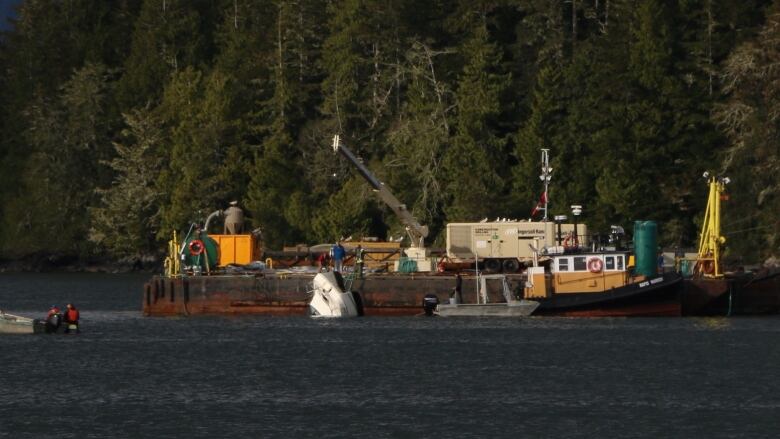Tofino boaters wonder why distress call-out didn't hit all radio channels
'A lot of boaters actually had no clue this was happening at all and weren't able to assist'

The operator of a water taxi-whale watching company in Ahousaht, B.C., is wondering why, when a fishing boat was in distress on Sunday, the emergency call-out didn't get broadcast on the popular channel used by boaters in the area
On Sunday afternoon, the 27-foot fishing vessel, Catatonic, began taking on water in three-metre swells and 25 knot winds near ClayoquotSound.
Five people were forced into the waterand by the time they were located, two had died.
Marcie Callewaert, who co-operates the company and lives in Ahousaht wasn't part of the rescue effort, because she didn't hear the Canadian Coast Guard's call-out on international distress channel, 16, because she was tuned to channel 68, the general channel for boaters.
"There was no broadcast put out or all-channel broadcast. It was just on channel 16, the Coast Guard's channel," said Callewaert. "So a lot of boaters actually had no clue this was happening at alland weren't able to assistbecause they didn't know."

She said there's a constant conversation going on on channel 68, the boat-to-boat channel, and if the distress call had been heard there, many more boaters would have responded, and some may have been much closer at the time.
"We've heard them here for kayakers in Sooke on all channels, when they interrupt on channel 68 and they direct you to channel 16, but no all-channel broadcast was put out in this case and a lot of people are interested or wondering, why?" Callewaert said.
"What's the criteria for an all-channel broadcast and why wasn't it put out in this case?"
According to Clay Evans, superintendent, Marine Search andRescue with the Canadian Coast Guard, channel 16 is connected to the CCG's powerful communications system that relays distress signals from centre to centre.
"Most mariners do not monitor Channel 68 on a consistent basis and, if they did, unless on duo-watch on their radio, might likely miss distress calls on Channel 16," said Evans.
"In the case of the most recent tragic incident, multiple air and water resources were already underway given the positional uncertainty provided by the subject vessel," he said.

Callewaertsaid, compared with the response from the Ahousaht community and local boaters after the Leviathan II tragedy in 2015, Sunday's response was much smaller, but Evans doesn't think having more boats on the water would have hastened the rescue.
"Although additional surface resources (vessels) are always welcome, it most likely would not have made a difference given the adverse sea conditions and the difficulty of spotting people in the water in these conditions from small vessels," said Evans, who points out that a float plane was responsible for eventually spotting the distressed boaters.












_(720p).jpg)


 OFFICIAL HD MUSIC VIDEO.jpg)
.jpg)



























































































